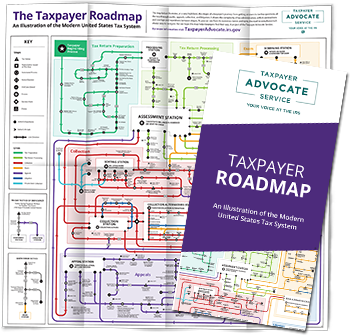Notice CP 2000
Request for Verification of Unreported Income, Payments, and/or Credits
View our interactive tax map to see where you are in the tax process. It could help you navigate your way through the IRS.
View our interactive tax map to see where you are in the tax process. It could help you navigate your way through the IRS.

Letter CP 2000 is sent to notify you that one or more items on your return don’t match what was reported to the IRS by third parties (e.g., employers or financial institutions).
This notice or letter may include additional topics that have not yet been covered here. Please check back frequently for updates.
The letter shows who reported the item that doesn’t match your return, the amount of the item, and explains how the item affects your tax return. Letter CP 2000 is not an IRS audit or a bill. The IRS is proposing to correct your return by adjusting the items listed in Letter CP 2000 unless you provide the IRS with information that shows why the amounts on your return are correct.

The IRS matches the information you reported on your tax return with information reported to IRS by third parties such as employers, banks, businesses, and others. If there is a discrepancy between the amount shown on your return and the amount reported to the IRS, Letter CP 2000 is sent to notify you of the difference, identify the third party who reported the amount in question, and propose adjustments to correct your return.
Read the letter and follow the instructions. Letter CP 2000 will show any amounts reported to the IRS by third parties that don’t match the amounts shown on your return. Compare the items listed in the Letter CP 2000 to the amounts you reported on your tax return to determine if your return was correctly filed or if an adjustment to your return is necessary. If you believe the amount reported by the third party to the IRS is incorrect or does not belong to you, you may need to contact the third party and ask that the item reported to the IRS be corrected.
Complete the form on page seven of your Letter CP 2000 to show whether you agree or disagree with the changes the IRS is proposing in the letter. If you agree, you do not need to amend your tax return. The IRS will make the adjustments detailed in the CP 2000. If you disagree, explain why you disagree and provide any documents or information that supports your position. Make sure to submit all documents and information to the IRS by the due date to the address in the letter. Don’t send original documents — send copies. If you fax the information, include your name and Social Security number or Taxpayer Identification Number on each page. This will help the IRS match your documents with your file. After the IRS reviews your response, it may accept your return as originally filed, ask you to send more information, or send you a Letter 3219, Statutory Notice of Deficiency, a legal notice that the IRS has determined a deficiency in your income tax (balance due).
Understanding your notice or letter
Get Help topics
Browse common tax issues and situations at TAS Get Help
If you think you’ll have trouble paying your taxes or the NFTL filing will cause economic hardship, it’s helpful to know what your options are to address your tax debt.
If you still need help
The Taxpayer Advocate Service is an independent organization within the IRS that helps taxpayers and protects taxpayers’ rights. We can offer you help if your tax problem is causing a financial difficulty, you’ve tried and been unable to resolve your issue with the IRS, or you believe an IRS system, process, or procedure just isn’t working as it should. If you qualify for our assistance, which is always free, we will do everything possible to help you.
Visit dev.taxpayeradvocate.irs.gov or call ![]() 1-877-777-4778.
1-877-777-4778.
Low Income Taxpayer Clinics (LITCs) are independent from the IRS and TAS. LITCs represent individuals whose income is below a certain level and who need to resolve tax problems with the IRS. LITCs can represent taxpayers in audits, appeals, and tax collection disputes before the IRS and in court. In addition, LITCs can provide information about taxpayer rights and responsibilities in different languages for individuals who speak English as a second language. Services are offered for free or a small fee. For more information or to find an LITC near you, see the LITC page on the TAS website or Publication 4134, Low Income Taxpayer Clinic List.